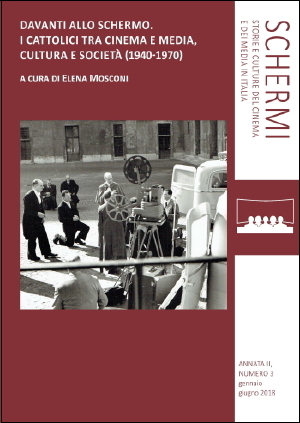Il mito del neorealismo in Bazin e Ayfre
DOI:
https://doi.org/10.13130/2532-2486/9604Parole chiave:
Catholicism, Neorealism, Religious cinema, PhenomenologyAbstract
l saggio ricostruisce le linee portanti dell’interpretazione religiosa del neorealismo, proposta da André Bazin e Amédée Ayfre tra la fine degli anni Quaranta e gli anni Cinquanta. Si individuano due concetti fondamentali, l’unità e la sacralità, con i quali i due studiosi disegnano la storia e l’estetica del neorealismo, fino a proiettare su di esse i tratti di un pensiero fortemente segnato da una declinazione religiosa e testimoniale della filosofia fenomenologica, nonché dal progetto culturale e politico della rivista «Esprit», che negli anni del dopoguerra promosse un dialogo tra il mondo cattolico e quello delle sinistre, in nome della centralità della persona.
The essay reconstructs the main lines of the religious interpretation of Neorealism, proposed by André Bazin and Amédée Ayfre between the late forties and the fifties. The essay identifies two fundamental concepts, “unity” and “sacredness”, that writers use draw up the history and aesthetics of Neorealism and to project the features of a thought process that is strongly marked by a religious and testimonial declination of Phenomenological philosophy. It moreover reveals cultural and political project of the magazine «Esprit», which in the post-war years promoted a dialogue between the Catholic world and the Left, in the name of the centrality of the person.
Downloads
Dowloads
Pubblicato
Come citare
Fascicolo
Sezione
Licenza
Gli autori che pubblicano su questa rivista accettano le seguenti condizioni:
- Gli autori mantengono i diritti sulla loro opera e cedono alla rivista il diritto di prima pubblicazione dell'opera, contemporaneamente licenziata sotto una Licenza Creative Commons - Attribuzione - Condividi allo stesso modo- che permette ad altri di condividere l'opera indicando la paternità intellettuale e la prima pubblicazione su questa rivista.
- Gli autori possono aderire ad altri accordi di licenza non esclusiva per la distribuzione della versione dell'opera pubblicata (es. depositarla in un archivio istituzionale o pubblicarla in una monografia), a patto di indicare che la prima pubblicazione è avvenuta su questa rivista.
- Gli autori possono diffondere la loro opera online (es. in repository istituzionali o nel loro sito web) prima e durante il processo di submission, poichè può portare a scambi produttivi e aumentare le citazioni dell'opera pubblicata (Vedi The Effect of Open Access).





